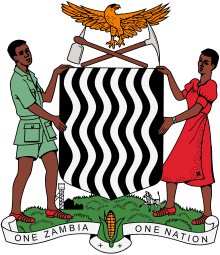Northern Rhodesian general election, 1954
 |
| This article is part of a series on the politics and government of Zambia |
|
|
Government |
|
Legislature |
General elections were held in Northern Rhodesia on 19 February 1954.[1] The result was a victory for the Federal Party, which won 10 of the 12 elected European seats in the Legislative Council.[2]
Campaign
Although Geoffrey Beckett, leader of the elected members in the Legislative Council, had called for the elections to be fought on a non-party basis, the Federal Party voted to contest the elections at a congress held on 6 January.[1] Beckett was prevented from contesting the elections after his nomination papers were rejected by the returning officer after he failed to return his declaration form in time.[1] In Livingstone the local Federal Party selected Llewellyn Oxenham as its candidate, but the party headquarters refused to ratify his nomination, instead nominating Harry Thom, who it was widely thought would stand down if he was elected to allow Beckett to be stand in a by-election.[1] The Ndola branch's selection of its candidate being overruled by the party executive after it was claimed new members had been enrolled and votes had been solicited in the bar of the local railway club where the vote took place.[1]
The Confederate Party opted not to contest the elections, although some members running as independents.[1]
Results
In mining towns Federal Party candidates defeated independents backed by the European Mineworkers Union and the European Salaried Staff Association. The only two seats in which they were defeated were the Midlands constituency near Lusaka (won by John Gaunt) and Livingstone, where Frank Derby won by 11 votes after the Federal Party vote was split between Oxenham and Thom.[3][2] Both Derby and Gaunt were members of the Confederate Party. Voter turnout was between 70 and 80% in the mining areas, but lower in other constituencies,[2] and around 60% overall.[4]
| Party | Votes | % | Seats |
|---|---|---|---|
| Federal Party | 4,549 | 54.31 | 10 |
| Independents[a] | 3,827 | 45.69 | 2 |
| Total | 8,376 | 100 | 12 |
| Source: East Africa and Rhodesia[4] | |||
a The unofficial Federal Party candidate in Livingstone was counted as an independent.
By constituency
| Constituency | Candidate | Party | Votes | % | Notes |
|---|---|---|---|---|---|
| Broken Hill | Herbert Roberts | Federal Party | 619 | 82.8 | Elected |
| William Kirkwood | Independent | 129 | 17.2 | ||
| Chingola | William Gray Dunlop | Federal Party | 325 | 56.9 | Elected |
| G D Crane | Independent | 246 | 43.1 | ||
| Eastern | Reuben Kidson | Federal Party | 175 | 54.0 | Elected |
| W B McGee | Independent | 149 | 46.0 | ||
| Livingstone | Frank Derby | Independent | 248 | 34.8 | Elected |
| Harry Thom | Federal Party | 237 | 33.3 | ||
| Llewellyn Oxenham | Federal Party (unofficial) | 227 | 31.9 | ||
| Luanshya | Rodney Malcomson | Federal Party | 463 | 44.7 | Elected |
| J F Purvis | Independent | 430 | 41.5 | ||
| A E Heller | Independent | 143 | 13.8 | ||
| Lusaka | Ernest Sergeant | Federal Party | 615 | 48.1 | Elected |
| Nan Staples | Independent | 531 | 41.5 | ||
| Richard Sampson | Independent | 132 | 10.3 | ||
| Midland | John Gaunt | Independent | 221 | 55.9 | Elected |
| Brian Goodwin | Federal Party | 174 | 44.1 | ||
| Mufulira | L Tucker | Federal Party | 483 | 48.1 | Elected |
| Alexander Stephens | Independent | 416 | 41.4 | ||
| A E Beech | Independent | 106 | 10.5 | ||
| Ndola | W F Rendell | Federal Party | 690 | 70.4 | Elected |
| Margaret Smith | Independent | 290 | 29.6 | ||
| Nkana | James Botha | Federal Party | 768 | 57.9 | Elected |
| A B Hunter | Independent | 559 | 42.1 | ||
| Northern | Harold Watmore | Federal Party | Unopposed | Elected | |
| South-Western | William Harris Wroth | Federal Party | Unopposed | Elected | |
| Source: East Africa and Rhodesia[4] | |||||
Aftermath
On 13 January four African members (Robinson Mwake Nabulyato from Southern Province, Safeli Hannock Chileshe from Central Province, Paskale Sokota from Western Province and Lakement Harvey Ngaundu from Northern Province) had been nominated for membership of the Assembly by the Northern Rhodesian African Representative Council from a field of 14 candidates.[5]
References
- 1 2 3 4 5 6 "Mr. G. B. Beckett's Nomination Invalid" East Africa and Rhodesia, 28 January 1954, p678
- 1 2 3 "Federal Party Success In N. Rhodesia: Mining Area Victories", The Times, 19 February 1954, p7, Issue 52860
- ↑ "N. Rhodesian Voting Analysed Federal Party's Hold", The Times, 20 February 1954, p5, Issue 52861
- 1 2 3 "Federal Party Wins in N. Rhodesia", East Africa and Rhodesia, 25 February 1954, p797
- ↑ "N. Rhodesian Changes: Unofficial Members' Responsibilities", The Times, 15 January 2011, p7, Issue 52830